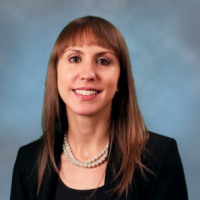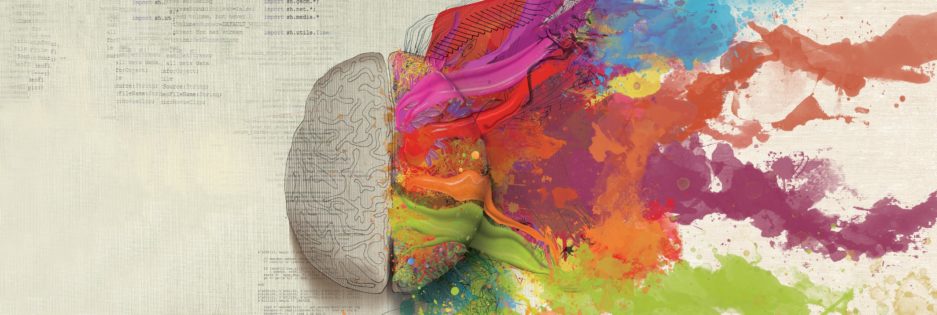In this column, I ask neuroscience professors from around the world the same five questions. Read on to learn more about their research, careers and goals for neuroscience in the future.

Interview with Alexandra Basilakos, Ph.D.
Alexandra Basilakos, Ph.D., CCC-SLP is an ASHA-certified speech-language pathologist and a research assistant professor with the Department of Communication Sciences and Disorders at the University of South Carolina. She earned both her B.A. and Ph.D. at the University of South Carolina, punctuated by time spent at the University of Georgia for her M.A. in Communication Sciences and Disorders. The overarching goal of her research is to improve the clinical management of aphasia in individuals who have suffered a stroke. To this end, her research focuses on using neuroimaging modalities, along with demographic, behavioral, and health-related factors, to understand the complex role of personal factors and brain health on stroke recovery.
A brief explanation of aphasia first:
I study aphasia, a language disorder that is caused by brain damage. The most common cause is stroke, but it can also occur due to other factors, like tumors, traumatic injuries, or multiple sclerosis. Aphasia affects a person’s ability to communicate and understand language. It can have negative effects on quality of life, as many individuals with aphasia report that it affects their ability to work and engage in social activities. Speech therapy is considered ‘standard of care’ for aphasia, but as of now, there is no cure for chronic aphasia.
1. What inspired you to pursue neuroscience as a career?
Long story short – my mentors inspired me…
Growing up, I never thought I would work in the sciences. I was more interested in the arts and design. When I got to college, I explored various fields (nursing, criminology, foreign language studies) before finally deciding to focus on psychology. As a psychology student, I was introduced to a professor (Dr. Steven Harrod at the University of South Carolina, USA) that was conducting research on a pre-clinical pharmacotherapy for methamphetamine addiction. I was fascinated by the topic and became involved in his research. It was this research experience that really sparked my interest in a career in neuroscience.
As I explored careers in neuroscience, I learned about topics like cognition and language, all of which I found interesting. However, I remained uncertain about my career path until my last year of college, when I learned about aphasia in a cognitive neuroscience class. Aphasia is a language disorder that is caused by brain injury – most commonly stroke (loss of blood flow to parts of the brain). Aphasia affects someone’s ability to speak, understand language, read, and write. Some people may recover from aphasia, but others may have aphasia that lasts for the rest of their lives. The more I read about aphasia, the more I wanted to know. I began investigating careers in speech-language pathology (speech-language pathologists, SLPs, are the clinicians who help people with aphasia regain communication abilities), and decided I would become an SLP. During my clinical training, I continued to do research. My mentor at the University of Georgia, where I completed my Master’s degree, was Dr. Rebecca Marshall. She was both a researcher and a clinician, and she motivated me to pursue my doctorate after my clinical training.
After clinical training, I was accepted to a PhD program at the University of South Carolina, under the mentorship of Dr. Julius Fridriksson, a world-renowned aphasia researcher. My doctoral work used magnetic resonance imaging (MRI) technology, along with assessment data (e.g., language tests) to understand how brain damage leads to aphasia, and how we can help people recover language in therapy.
This is just a snapshot of my educational experience. When I think back to how I ended up where I am now, my mentors were (and still are) my inspiration. Those named above (Dr. Steven Harrod, Dr. Rebecca Marshall, and Dr. Julius Fridriksson), and many others, taught me valuable skills and challenged me in ways that I was able to grow as a researcher. I owe a lot of my success to their training.
2. What do you think is the most important goal of neuroscience research?
For me, understanding how we can use research to help people is crucial. As our population ages, and as the survivability of stroke increases, the coming years are likely to see a large increase in individuals with age related neurological decline (e.g., Alzheimer’s and other dementias), or those living with post-stroke impairments. Understanding the effects of neurologic impairment provides important information about the brain, but importantly, it can help us develop therapeutic interventions to improve quality of life for those affected by neurologic disorders or injury. With research, we have the opportunity to develop strategies that can help a lot of people with aspects of their daily lives.
3. What are the main topics and goals of your research?
The main goal of my research is to improve therapy for individuals with aphasia. To this end, we use tools like MRI, along with language and cognitive testing, to predict how a stroke may affect an individual’s ability to communicate. We also consider how personal factors may help us identify effective treatments. In addition to helping patients recover, our work helps SLPs learn more about treating aphasia so that they can provide quality care to survivors.
4. What accomplishment do you think is the most important out of your own research?
The research group I work with has pioneered some state-of-the art methods for neuroimaging in stroke. These methods will help us, and other researchers, understand relationships between the brain and language.
Aside from our technologies, our research group has created a wonderful outreach program for the stroke survivors that participate in our research. Through this program, my colleagues and I have helped stroke survivors form their own supportive community, hopefully reducing isolation that many stroke survivors with aphasia experience.
5. What do you hope to accomplish in the next 10 years in the field of neuroscience?
This is a great question! In the next 10 years, I hope to understand aphasia from the “whole person” approach. There is a lot to know about how the brain works, especially after an injury. I’m interested in how overall health (e.g., conditions like diabetes, heart disease, etc), social engagement and interaction and mental health (e.g., anxiety/depression) may affect the health of the brain, and how that affects recovery after injury.
I also hope to understand how we can use technology (e.g., MRI, brain stimulation) to optimize recovery.
Bonus question: What is your advice to a teenager who wants to learn more about neuroscience?
Don’t be afraid to reach out to scientists who are doing work that interests you. See if you can visit their lab, talk to their research team. Many universities have programs for high school students who are interested in the sciences. Reach out to investigators or programs in your area to find out if there are programs that you can be involved in, or if they need volunteers/research assistants. I have had the opportunity to work with many high school students in research through these programs, many who are continuing to pursue careers in medicine or the sciences.
